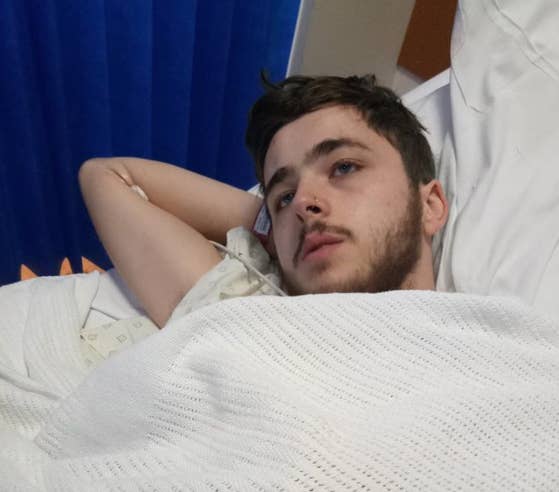
Lindsay Carter, the first young Queenslander to be granted legal access to schedule 9 medicinal cannabis in 2016, was discharged from palliative care on Monday.
Recently back from a trip to Canada, 19-year-old Carter's medical supply is running low and he faces the very real possibility of being without the drug that has managed to largely stop his daily seizures. The family has journeyed to Canada or the USA five times in the last four years.
Palliative care workers told Lindsay and his mother, Lanai, that they could not prescribe medical cannabis to him outside of palliative care trials.
Carter, who suffers from intractable epilepsy and a brain tumour, doesn't qualify for those trials as he has already been prescribed the drug in the past.
Doctors in Queensland could prescribe Lindsay with a legal source (again), but this would take time and could result in a gap where Lindsay has no medication. He has already experienced a significant gap in supply due to this process once before.
The products available to Lindsay through Australia's legal pathway are also not as concentrated as the products he used successfully overseas.
On Monday, Carter's mother Lanai told BuzzFeed News this was just another handoff between public and private health care providers. She says the reality is there is a risk that Lindsay could die any day from a seizure or a brain bleed, or suffer permanent brain damage.
The combination of oil and bud the Carters managed to find in Canada has served Lindsay reasonably well, greatly improving his wellbeing and reducing seizures – but that supply is already running out. Oil he was on in Washington State during a recent US trip controlled his seizures 100%, but he was unable to leave America with his oil due to the country's laws.
Lanai Carter says Lindsay's current supply will last until the end of the week.
Not that long ago Lindsay Carter was the poster boy of medical cannabis in Australia. He and a handful of others featured in international broadsheets and political doorstops, as politicians and reporters battled to gain the Carter family's confidence.
Years later, and with state and federal governments implementing multiple versions of cannabis access pathways intended to hasten the flow of prescription, the Carters are stuck.
"The system is a complete failure," said Lanai, who explained that a epileptologist overseas had told the Carters they could almost guarantee that not one of the 20 anti-epilepsy drugs on the market globally would control Lindsay's epilepsy. "This is our only option."
Even if the Carters are able to navigate through Australia's legal medical cannabis scheme successfully Lanai says the family would not be able to afford her estimated cost of $46,507, the fee for a steady 12-month supply. Lindsay has already gone through five successful approval rounds in Australia, four for bud and one for oil.
But the Carters aren't strangers to the bureaucratic roundabouts one has to navigate in order to access legal medical cannabis in Australia.
There are doctors in Queensland who could continue to prescribe the drug for Lindsay but access via a specialist would drastically decrease waiting times resulting in less gaps in supply.
In December Lanai outlined the lengthy process the family has gone through in the past, working through palliative care, neurology, GPs, and the TGA.
Since then, federal health minister Greg Hunt has announced a "one-stop" national rollout scheme. Politicians from across the country agreed to the scheme in principal. It is currently working in NSW, Victoria, and Queensland.
An online portal now means there is an easier pathway for applications – but not for approvals. It also doesn't deal with the issue of affordability.
For the Carters, Lindsay's dismissal from palliative care is another hurdle that leaves the family with more questions than answers. Without legal access, the health risks for Lindsay are grave, and the black market of medical cannabis suppliers many Australians once relied on has been significantly hampered since police across the country conducted multiple raids on high-profile suppliers.
"It's the same problems, again and again," said Lanai.
"If we know the oils that can work for Lindsay we shouldn't settle for second best options. For us it's about our son having the best possible care.
"Some may think we are perfectionists but there is nothing 'perfectionist' about trying to stop seizures fullstop and getting the best health outcomes for our child."
